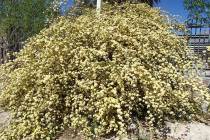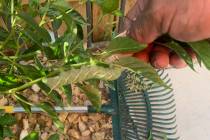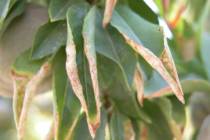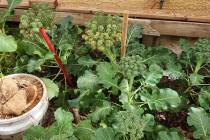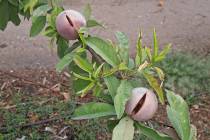Keep produce fresh by understanding properties
Did you know that Americans throw out 25 percent of the produce they buy because it's gone bad? According to a family food-use study from the University of Arizona and the United States Department of Agriculture, the families studied tossed out an average of 470 pounds of food per year, about 14 percent of all food brought in to their homes.
With the peak summer growing season just around the corner, a bounty of fresh, local organic produce will be at your fingertips. To keep these fruits and veggies fresh, the professionals at Wild Oats Marketplace suggest:
* Store compatible fruits together. If your produce rots just a few days after buying, you're probably storing incompatible fruits together. Produce that releases ethylene gas, a ripening agent, will speed the decay of ethylene-sensitive foods. Gas releasers include apples, unripe bananas, cantaloupe, apricots, avocadoes, peaches, pears, plums and tomatoes. These items should be kept away from broccoli, ripe bananas, carrots, cucumbers, lettuce and leafy greens, peppers and watermelon.
* One bad apple spoils the whole bunch. Mold spreads quickly and contaminates nearby food, so dump any spoiled produce immediately to avoid an entire bin of rotten fruits and vegetables.
* Use gases to your advantage. Craving a peach and it just won't ripen? Store it in a closed paper bag with a ripe banana or apple and let the trapped ethylene gas work to your advantage.
* Keep produce whole. Don't even rip the stem off of a piece of fresh fruit until you are ready to eat it. Slicing, dicing and pulling foods apart breaks down their cells, leading to the growth of microorganisms.
* Eat more perishable items first. Eat items that spoil quickly (avocadoes, mushrooms, bananas, strawberries, lettuce and grapes) first and save slow spoilers (apples, peppers, oranges, watermelon, carrots and tomatoes) for last.
* Don't refrigerate potatoes, onions, winter squash or garlic. They should be kept in a cool, dark cabinet, where they can last up to a month or more. Also, storing tomatoes at room temperature helps maintain their flavor. But, be sure to keep these veggies separate, as their flavors and smells can migrate.
Freeze 'em
Often times, we buy more produce than we can eat, especially when it's on sale. Freezing excess produce and saving it for winter will provide a burst of summer when fresh fruits and vegetables aren't as widely available. Always label freezer bags or storage containers with the contents and date. Frozen produce will be good for up to one year, and should always be thawed in the refrigerator when ready to enjoy.
* Bananas. Freeze overripe bananas, or peel and blend into a puree. Thaw whole for 15 minutes before removing the peel. Excellent for muffins, quick breads and pancakes.
* Berries. To preserve blueberries, raspberries, blackberries, cranberries and strawberries, rinse under ice-cold water and dry completely; hull strawberries. Place berries on a baking sheet, freeze and then transfer to a freezer bag or container.
* Cherries. Rinse in ice-cold water, dry completely and pit. Place cherries on a baking sheet, freeze then transfer to a freezer bag or container.
* Melons. Simply peel honeydew or cantaloupe, remove the seeds and cut into slices, chunks or balls. Place in a freezer bag or container. Watermelons, however, are the only melon that will not freeze well.
* Peaches. Cut an "X" into the bottom of each peach. Place in a large pot of boiling water for 30 seconds. Allow to cool slightly and peel off the skin. Slice in half and remove the pit. Cut into slices or cubes. Toss with a tablespoon or two of lemon juice to prevent browning. Place in a freezer bag or container.
For more information on how to keep produce fresh, log on to www.wildoats.com.










